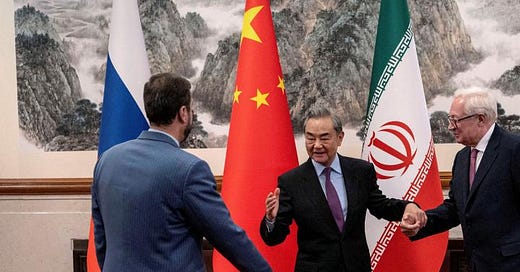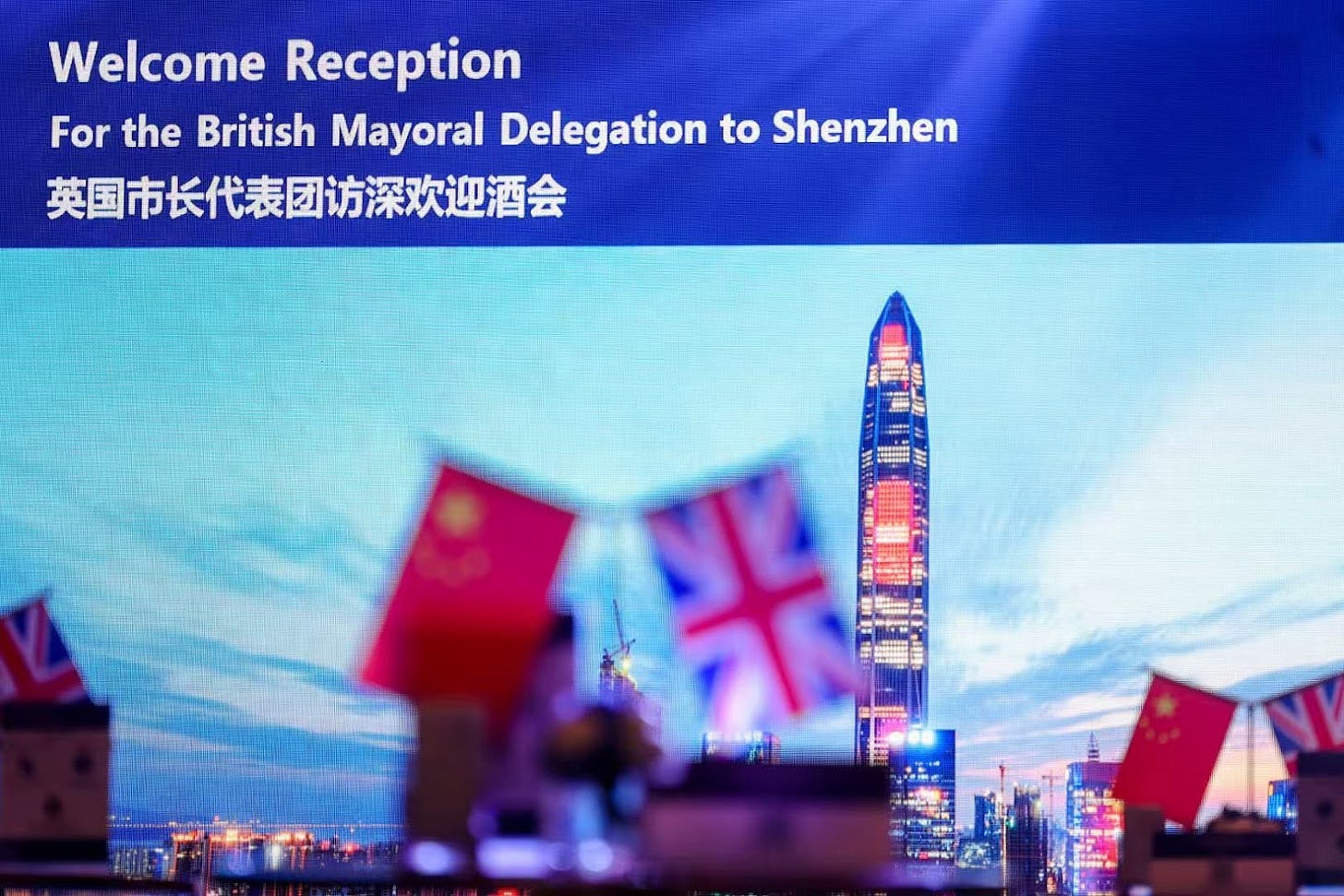UK & China: Smart, Naive or Complicit?
Largest ever civic delegation from UK to China begs the question
In 2023-24, China was the UK’s 12th source of FDI, lagging behind Ireland and Australia.
It was responsible for less new jobs than Sweden (and that is without removing the projects which are simply acquisitions).
Chinese investment in the UK amounts to little more than a quarter of 1% of total foreign investment and yet politicians at national and local levels are increasingly seduced by its allure.
The opportunity to attract Chinese FDI to the UK has been ridiculously over-hyped and has constantly failed to deliver the jobs and investments promised, even during the ‘golden era’ under former PM David Cameron. In 2022, Rishi Sunak jettisoned that strategy and said:
"We recognise China poses a systemic challenge to our values and interests, a challenge that grows more acute as it moves towards even greater authoritarianism."
Nothing has changed in the last few years. In fact, during the last few weeks alone, the growing threat of China has been in evidence:
China conducted naval warship manoeuvres with Russia and Iran in the Gulf of Oman, reaffirming their increasing military links.
China was accused of facilitating Russia’s military drone production by helping smuggle Western components into the country.
UK-based student seized on return to China for attending a London demonstration.
China, Russia and Iran discussed closer collaboration in Beijing, May 2025.
And meanwhile, the UK government seems to be getting closer and closer to China:
Chancellor Rachel Reeves was criticised for a trip to Beijing to meet with Vice Premier and CCP Politburo member, He Lifeng.
Newly appointed UK cabinet minister, Emma Reynolds has been criticised for her pro-China stance.
UK ministers have blocked a bid to ban government funds from buying Chinese solar panels feared to have been made with slave labour.
UK Mayors Delegation
So, it was with great interest that I have been following the “largest ever civic delegation” to China involving the mayors and deputy mayors of several major UK cities (including London, Birmingham, Liverpool, Derby, Bristol and Sheffield). The party were in China meeting with the city leaders of the Chinese Communist Party in Shenzhen, Chongqing and Shanghai.
A key objective was to encourage inward investment from China.
So the mayors visited companies like Tencent and Huawei with much fanfare from the hosts. Which isn’t really surprising given the ongoing difficulties each has had in getting embedded in western markets.
Huawei is banned from investing in sensitive parts of the UK’s 5G infrastructure and their products must be removed by 2027 (although their energy-related work is not included in the ban). Huawei is also banned from operating in Australia, Japan, Taiwan, Vietnam, India, Germany, France (and another 8 EU states), Canada and the US. Just last week, police in Belgium detained several Huawei lobbyists as part of an investigation into corruption in the European Parliament.
Tencent is described by the US as a ‘military company’ and is blacklisted by the Pentagon. UK companies that supply the MOD and NATO have been cutting ties to Tencent recently. The Chinese government’s “Military-Civil Fusion Strategy” aimed at erasing the barriers between civilian and military sectors is a major concern. It is a core element of China’s broader efforts to modernise its military, the People’s Liberation Army, and strengthen its national defence capabilities.
Key recurring themes were the opportunities around Artificial Intelligence and the embracing of Chinese AI startups. As with Huawei and Tencent, there are major concerns over Chinese AI’s attitude to freedom of expression. Chinese AI is great, until you start asking Deepseek about Tiananmen Square or Taiwan.
Cities Cutting China Ties
In recent years, there have been a growing number of cities that have cut ties and ended sister-city agreements with China in response to the growing security threat and human rights abuses.
Gothenburg and Prague severed links with Shanghai and Beijing respectively, while in 2022, Newcastle ended twinning with Taiyuan amid torture claims. Pressure on Nottingham to end its Ningbo partnership would cost the city £100m according to reports, which was a key factor in maintaining the link.
And therein lies the dilemma.
Do we want inward investment and economic growth at any cost?
Are there any projects local economic developers would turn away on ethical, moral or security grounds?
Or are we all so desperate for growth that we’ll just hold our noses and look the other way?
These are dangerous and uncertain times as every morning headline reminds us, and we can’t afford to be naive or complicit in the face of smart and strategic foes.






FDI what about FDD - Foreign Direct Disinvestment - which way is it going to go with Chinese owned British Steel ?